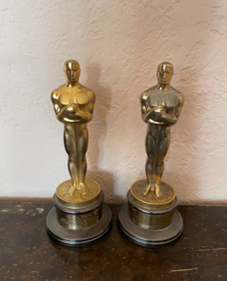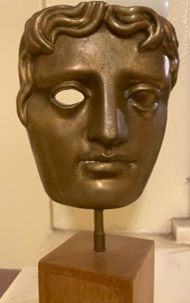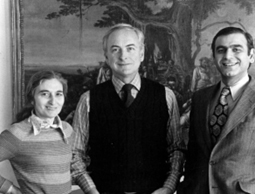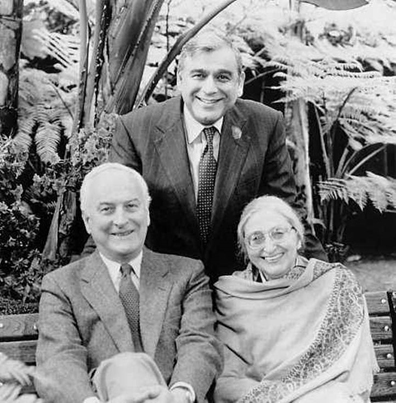RUTH JHABVALA, ISMAIL MERCHANT & JAMES IVORY
THE BEGINNING IN INDIA
 A turning point in Ruth’s career came when she met Ismail Merchant and James Ivory in 1961 in Delhi. She worked with them on her first screenplay, adapting her book, The Householder, into a movie that marked the beginning of a collaboration that lasted for the rest of her life. Their close friendship and working relationship are credited in keeping them together for so many years. As James Ivory recently put it: Ismail Merchant was the Congress, I was the President and Ruth was The Supreme Court. But the three of us had agreed to a separation of powers in order to govern effectively. Respect, forbearance-- and close friendships—carried the 3 of us along for 23 produced films.
A turning point in Ruth’s career came when she met Ismail Merchant and James Ivory in 1961 in Delhi. She worked with them on her first screenplay, adapting her book, The Householder, into a movie that marked the beginning of a collaboration that lasted for the rest of her life. Their close friendship and working relationship are credited in keeping them together for so many years. As James Ivory recently put it: Ismail Merchant was the Congress, I was the President and Ruth was The Supreme Court. But the three of us had agreed to a separation of powers in order to govern effectively. Respect, forbearance-- and close friendships—carried the 3 of us along for 23 produced films.
Ruth always saw herself as a novelist first and not a screenwriter. This is how she describes the beginning of her screenwriting career:
I wasn't even a film buff, I didn't see many films ever. I never thought of it until Merchant Ivory came to India and filmed one of my books - they said 'Why don't you write the screenplay?' and I said, 'Well, I've never written a screenplay and I haven't seen many films', because I was in India by that time and hadn't really had any opportunity to see new films or art films or classic films or anything. So they said, 'Well try. We haven't made a feature film before.' So that was really my introduction into film.
RUTH CONTINUES AS A SCREENWRITER
 The next 3 films were set in India, using original screenplays written by her. These were Shakespeare Wallah, The Guru and Bombay Talkies. The last screenplay she wrote before she left India was set in England, Autobiography of a Princess, starring Madhur Jaffrey and James Mason.
The next 3 films were set in India, using original screenplays written by her. These were Shakespeare Wallah, The Guru and Bombay Talkies. The last screenplay she wrote before she left India was set in England, Autobiography of a Princess, starring Madhur Jaffrey and James Mason.
Ruth continued to write many original screenplays, such as Roseland and Jefferson in Paris, but she is best known for her adaptations of books by Henry James, E.M. Forster, Kazuo Ishiguro, Evan Connell, Jean Rhys, Peter Cameron, Kaylie Jones and Diane Johnson (among others). She won an Academy Award for best adapted screenplay for Room With A View in 1987 and another for Howards End in 1993. She was also nominated for an Academy Award for Remains of the Day. Ruth was awarded The Writers Guild of America’s Screen Laurel Award, which is the Guild’s highest honor.
ON WRITING AND ADAPTING
 Along with The Householder, Ruth’s book, Heat and Dust was also adapted into a film, winning the Best Adapted Screenplay Award from BAFTA. After The Householder, she wrote a number of original screenplays and adapted multiple novels for the screen. When asked why she picked so many classics to adapt, she replied:
Along with The Householder, Ruth’s book, Heat and Dust was also adapted into a film, winning the Best Adapted Screenplay Award from BAFTA. After The Householder, she wrote a number of original screenplays and adapted multiple novels for the screen. When asked why she picked so many classics to adapt, she replied:
…the main purpose is that I have such a good time - I mean think of all that marvelous material. Just think of spending all that time in The Golden Bowl and other James and Forster books we have done. But especially Henry James because, not so much in Golden Bowl, but the other two [The Europeans, The Bostonians] - he has such marvelous characters and he has such strong dramatic scenes. You just put your hand in and pull them out.
Writing about turning a book into film, even her own, she had this to say:
Fidelity (to the book) is not the first [thing] … the theme and the feel of the characters, the ambience and their relationships that is what you try for but never, never literally. Since we did not have time for four or six hours (in a film), I thought, well we might as well adapt ourselves to what we have, and just take the essence of the situation and each incident and turn in the story. We couldn't dwell on it.
THE SCREENWRITER'S ROLE
 For Ruth, the first stage of writing a screenplay was the "nice bit", when she wrote more or less on her own. And then came the “unpleasant bit…when they all go off, 100 people - actors and camera people and film and sound - and I stay away”. And then, “When they go into the editing room, I come in again, and that's the bit I like.” She felt very strongly, that a screenwriter’s work was not done till the rushes had been viewed at a private screening and then scrutinized over and over again in the editing room. Again, from James Ivory:
For Ruth, the first stage of writing a screenplay was the "nice bit", when she wrote more or less on her own. And then came the “unpleasant bit…when they all go off, 100 people - actors and camera people and film and sound - and I stay away”. And then, “When they go into the editing room, I come in again, and that's the bit I like.” She felt very strongly, that a screenwriter’s work was not done till the rushes had been viewed at a private screening and then scrutinized over and over again in the editing room. Again, from James Ivory:
In the editing room Ruth’s method was one of calm reason. All of our editors who over the years cut our pictures were in awe of her. When I objected to her judicial decisions too often—when too many of my “must have” passages were going onto the floor—there would be an acid comment from her…
Ruth’s film papers, including correspondence and screenplays are at the University of Oregon in Eugene.
